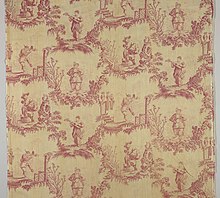Percale

Percale[1] is a closely woven plain-weave fabric often used for bed covers. Percale has a thread count of about 180 or higher and is noticeably tighter than twill or sateen. It has medium weight, is firm and smooth with no gloss, and washes very well. It is made from both carded and combed yarns, and may be woven of various fibers, such as cotton, polyester, or various blends.[2]
History
[edit]Moris or mauris was the 18th-century French term used for percale, the cloth imported from India.[3][4] It was a cotton cloth. Moris was the third most exported fabric from Coromandel Coast after Longcloth and Salampore. It was superior and finer quality than the peers. Coromandel coastline forms a part of Tamil Nadu and Andhra Pradesh. Moris was produced at Nellore, Arni, Maduranthakam, and Cuddalore. Palakollu.The cloth was famous as painted chintz in southeast countries also.[5] [6][7][8]
Percale was formerly imported from India in the 17th and 18th centuries,[9] then manufactured in France.[10]
Etymology
[edit]The word may originate from the Persian: پرگاله : pargālah, meaning rag,[11][12] although the Oxford English Dictionary (as of December 2005) has traced it only as far as 18th-century French. The dictionary of the Institut d'Estudis Catalans describes pexal and perxal as some kind of silk fabric in the year 1348 in Valencia.[13] The etymological dictionary of Catalan explains perxal as derived from Perche in France.[14]
See also
[edit]References
[edit]- ^ How India clothed the world: the world of South Asian textiles, 1500–1850, volume 4 of Global Economic History series, p. 440, Giorgio Riello, Tirthankar Roy, Om Prakash, published by Brill, 2009, ISBN 978-90-04-17653-9.
- ^ "Fabric Glossary". Dotmaison magazine.
- ^ Wellington, Donald C. (2006). French East India Companies: A Historical Account and Record of Trade. Hamilton Books. p. 223. ISBN 978-0-7618-3475-5.
- ^ Wingate, Isabel Barnum (1979). Fairchild's dictionary of textiles. Internet Archive. New York : Fairchild Publications. p. 378. ISBN 978-0-87005-198-2.
- ^ Arasaratnam, Sinnappah; Arasaratnam, Professor and Head of Department of History Sinnappah; Arasaratnam, Maritime History Scholar and Professor of Indian History S. (1986). Merchants, Companies, and Commerce on the Coromandel Coast, 1650-1740. Oxford University Press. pp. 99, 52, 340. ISBN 978-0-19-561873-0.
- ^ Journal of Indian History. Department of Modern Indian History. 2007. p. 23.
- ^ Amrith, Sunil S. (7 October 2013). Crossing the Bay of Bengal. Harvard University Press. p. 53. ISBN 978-0-674-72846-2.
- ^ How India Clothed the World: The World of South Asian Textiles, 1500-1850. BRILL. 31 July 2009. p. 289. ISBN 978-90-474-2997-5.
- ^ Jennifer Speake, ed. (1999). "percale, noun". The Oxford Essential Dictionary of Foreign Terms in English. Berkley Books. Retrieved 18 December 2007.
{{cite book}}:|website=ignored (help) - ^ "percale, n. and adj.", Draft Revision Dec. 2005, Oxford English Dictionary
- ^ "percale", The American Heritage Dictionaries, at answers.com
- ^ A comprehensive Persian-English dictionary: including the Arabic words and phrases to be met with in Persian literature, being, Johnson and Richardson's Persian, Arabic, and English dictionary, revised, enlarged, and entirely reconstructed, The World's Most Detailed and Comprehensive Persian-English Dictionary, Francis Joseph Steingass, Asian Educational Services, 1992. ISBN 978-81-206-0670-8
- ^ Diccionari Aguiló: materials lexicogràfics / aplegats per Marià Aguiló i Fuster; revisats i publicats sota la cura de Pompeu Fabra i Manuel de Montoliu, page 134, Institut d'Estudis Catalans, Barcelona 1929.
- ^ Diccionari etimològic i complementari de la llengua catalana: O-Qu.- 1986, cop. 1985.- 977 p, page 464, Joan Corominas, Joseph Gulsoy, Max Cahner, Curial Edicions Catalanes, 1995. ISBN 978-84-7256-276-9
External links
[edit] Media related to Percale at Wikimedia Commons
Media related to Percale at Wikimedia Commons
